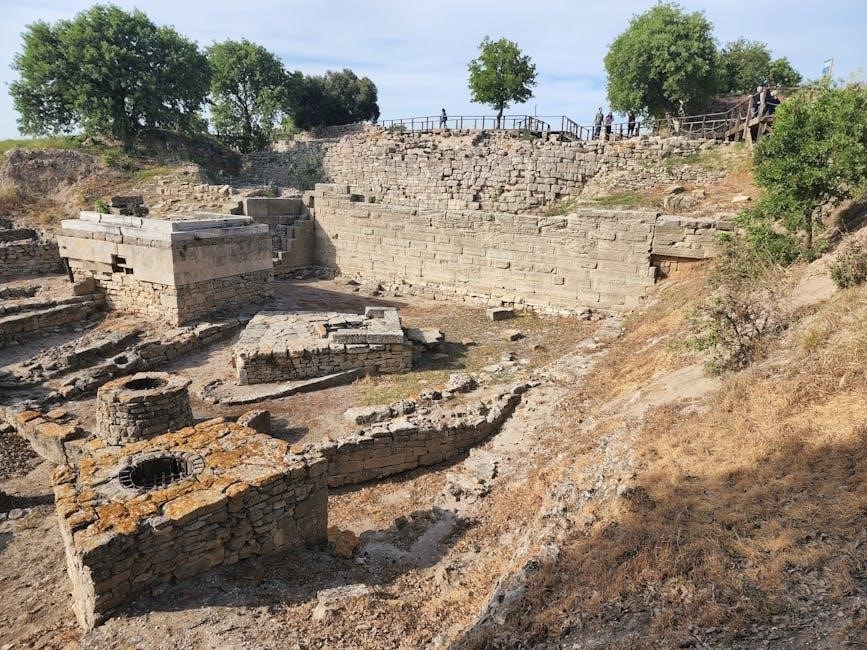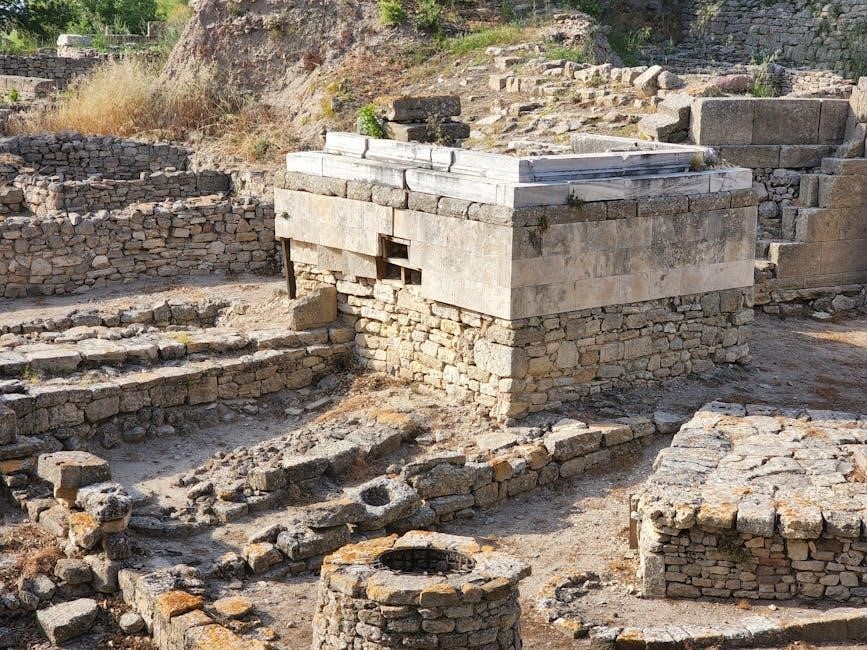Robert Fagles’ translation of the Iliad masterfully blends modern sensibility with ancient grandeur, capturing Homer’s epic tale of human conflict and divine intervention.
1.1 Overview of the Iliad as an Epic Poem
The Iliad is an ancient Greek epic poem, attributed to Homer, recounting the legendary Trojan War. Focused on Achilles’ rage and the human condition, it explores themes of savagery, destiny, and triumph. Its structure, invoking the Muses, presents a narrative of heroism and grief, making it a cornerstone of Western literature and a timeless exploration of humanity’s complexities, vividly captured in Robert Fagles’ translation.
1.2 Robert Fagles and His Approach to Translation
Robert Fagles, a renowned translator, brings a modern poetic sensibility to the Iliad, blending accessibility with the epic’s grandeur. His approach prioritizes emotional intensity and vivid imagery over strict adherence to meter, creating a fluid, contemporary idiom. Collaborating with Bernard Knox, Fagles’ work is enriched by scholarly insights, ensuring the ancient text resonates with modern readers while preserving its timeless essence and universal themes.

Historical Context of the Iliad
The Iliad, attributed to Homer, is the oldest surviving work of Western literature, set during the Trojan War, a pivotal event in ancient Greek history and culture.
2.1 The Trojan War and Its Significance
The Trojan War, central to the Iliad, embodies a clash of civilizations, highlighting honor, revenge, and fate. Its significance lies in shaping Greek identity and literature, influencing art and thought for millennia, as seen in Robert Fagles’ translation, which vividly portrays the conflict’s emotional depth and universal themes, making it a cornerstone of Western cultural heritage.
2.2 Homer’s Authorship and the Oldest Surviving Work of Western Literature
Homer, traditionally credited with the Iliad and Odyssey, remains shrouded in mystery. The Iliad stands as the oldest surviving work of Western literature, its authorship debated but its impact undeniable. Robert Fagles’ translation preserves the epic’s timeless essence, ensuring its continued relevance in modern times, while scholars continue to explore Homer’s identity and the poem’s historical context.

Key Themes in the Iliad
The Iliad explores themes of human conflict, divine intervention, and the inevitability of fate. Fagles’ translation vividly captures the emotional intensity and complexity of Homer’s epic, highlighting the fragility of human life amidst war and heroism.
3.1 The Human Condition: Savagery, Calculation, and Destiny
Robert Fagles’ translation of the Iliad profoundly explores the human condition, revealing the duality of savagery and calculation in war; The epic portrays the brutality of conflict, the strategic decisions of leaders, and the inevitability of destiny. Fagles’ vivid rendering captures the emotional depth, illuminating how human nature is shaped by both primal instincts and the inexorable pull of fate, resonating universally across time.
3.2 Triumph and Grief: Emotional Intensity in the Epic
Robert Fagles’ translation of the Iliad masterfully captures the emotional intensity of triumph and grief. From Achilles’ rage to the sorrow of fallen warriors, Fagles’ vivid language conveys the raw emotions of war. The epic’s portrayal of human vulnerability and the devastating consequences of conflict creates a profound connection with readers, making the ancient tale resonate with timeless emotional depth and power.

Robert Fagles’ Translation Style
Robert Fagles’ translation of the Iliad is celebrated for its poetic yet accessible language, blending modern sensibility with ancient grandeur to create a powerful, emotionally resonant narrative.
4.1 A Modern Sensibility While Maintaining Ancient Grandeur
Robert Fagles’ translation of the Iliad strikes a balance between modern readability and the epic’s timeless grandeur. His use of contemporary language ensures accessibility while preserving the poetic majesty and emotional depth of Homer’s original work. This approach allows readers to connect with the ancient narrative on a profound level, making the classic tale resonate anew.
4.2 Fluid and Accessible Language in Translation
Fagles’ translation is renowned for its fluidity and accessibility, making Homer’s ancient epic reachable to modern readers. His prose avoids rigid adherence to Homeric meter, instead emphasizing clarity and emotional intensity. This ensures the Iliad’s themes and characters are vividly portrayed, maintaining the original’s power while offering a fresh, engaging reading experience for contemporary audiences.

Sources for Downloading the Iliad by Robert Fagles in PDF
Open Library and Internet Archive offer free PDF downloads of Robert Fagles’ Iliad, providing a seamless experience for readers seeking the classic epic.
5.1 Open Library and Its Vast Collection
Open Library is a reliable platform offering free PDF downloads of Robert Fagles’ Iliad. With over 1 million eBooks, it provides a seamless experience for readers. Users can borrow or download PDF files after creating a free account, making it an accessible resource for accessing Fagles’ acclaimed translation of Homer’s epic poem.
5.2 Internet Archive and Other Reliable Platforms
Internet Archive is another trusted source for downloading Robert Fagles’ Iliad in PDF. It offers a comprehensive collection of free eBooks, including classic works like Homer’s Iliad. Users can easily search and download PDF versions without registration, ensuring convenient access to Fagles’ translation. This platform is widely recognized for its extensive library and user-friendly interface.
Critical Reception of Fagles’ Translation
Robert Fagles’ translation of the Iliad is widely praised for its emotional intensity and vivid imagery, capturing the grandeur of Homer’s epic while offering a modern, accessible interpretation.
6.1 Praise for Emotional Intensity and Vivid Imagery
Robert Fagles’ translation of the Iliad is celebrated for its profound emotional intensity and vivid imagery, masterfully capturing the human drama and epic scale of Homer’s original work. Critics acclaim Fagles’ ability to convey the raw emotions of Achilles’ rage and the tragic inevitability of war, blending poetic lyricism with a modern, accessible style that resonates with contemporary readers while honoring the ancient text’s timeless themes.
6.2 Comparison with Other Translations of the Iliad
Robert Fagles’ translation stands out among others for its balance of poetic elegance and readability. Unlike stricter, metered versions, Fagles’ approach emphasizes emotional depth and narrative flow, making it accessible while preserving Homer’s grandeur. Critics often compare it favorably to translations by Richmond Lattimore and Alexander Pope, noting Fagles’ unique ability to blend modern sensibility with the epic’s ancient essence, ensuring his work remains a benchmark in classical literature.

The Iliad’s Influence on Literature and Art
The Iliad has profoundly shaped Western literature, inspiring writers like T.S. Eliot and influencing artistic works across centuries, cementing its timeless impact on creative expression and cultural heritage.
7.1 Impact on Western Literature and Modernist Writers
The Iliad stands as a cornerstone of Western literature, influencing countless writers, from ancient Greeks to modernists like T.S. Eliot. Robert Fagles’ translation revitalizes Homer’s epic, making its themes of human struggle and divine intervention accessible to contemporary readers, ensuring its enduring relevance in shaping literary and artistic expression across generations.
7.2 Inspiration for Artistic and Literary Works
Homer’s Iliad, particularly through Robert Fagles’ vivid translation, has inspired countless artistic and literary works. Its themes of heroism, conflict, and human emotion have influenced films, novels, and stage productions. Fagles’ poetic yet accessible language has made the epic accessible to modern audiences, further cementing its role as a timeless source of creative inspiration across various mediums and genres.
The Structure and Composition of the Iliad
The Iliad is structured as an epic poem, divided into 24 books, focusing on a pivotal episode in the Trojan War. Fagles’ translation preserves this narrative framework, blending poetic grandeur with accessible language to convey Homer’s timeless story of conflict and human emotion, ensuring its enduring appeal across generations.
8.1 The Darkest Episode of the Trojan War
The Iliad centers on the darkest episode of the Trojan War, focusing on Achilles’ rage and the devastating conflict it ignites. Fagles’ translation vividly portrays the intense emotions and tragic consequences of this pivotal moment, highlighting the human cost of pride and vengeance. His poetic yet accessible language captures the epic’s dramatic intensity, making the ancient tale resonate powerfully with modern readers.
8.2 Invocation of the Muses and Narrative Technique
The Iliad begins with Homer’s invocation of the Muses, seeking divine inspiration to recount the tale of Achilles’ rage. Fagles’ translation captures this timeless narrative technique, blending poetic elegance with clarity. The epic’s non-linear structure, starting in the war’s midst, adds dramatic depth, while Fagles’ rendering ensures the invocation and storytelling remain accessible, preserving the ancient text’s emotional and thematic richness for modern readers.

The Role of Achilles in the Iliad
Achilles’ rage and transformation drive the epic narrative, as Fagles’ translation vividly captures his humanization, showcasing a hero torn between honor, grief, and destiny.
9.1 Achilles’ Rage and Transformation
Achilles’ rage ignites the core of the Iliad, as Fagles’ translation vividly portrays his transformation from a vengeful warrior to a figure grappling with human vulnerability. His fury, sparked by the loss of Briseis and Patroclus, unfolds as a complex exploration of honor, grief, and destiny. Fagles’ rendering captures the emotional intensity, revealing Achilles’ psychological depth and the tragic humanization of a legendary hero.
9.2 Psychological Depth and Humanization of a Hero
Achilles’ character in Fagles’ translation is rendered with profound psychological depth, showcasing his vulnerability and humanity. His grief, pride, and internal conflicts are vividly portrayed, making him relatable despite his legendary status. Fagles’ nuanced language captures Achilles’ emotional struggles, transforming him from a mythical figure into a complex, multidimensional being, whose pain and rage resonate deeply with readers across centuries.

The Iliad’s Relevance in Contemporary Times
The Iliad’s themes of human emotion, conflict, and fate remain universally relevant, resonating in contemporary times through Fagles’ modern translation, inspiring new adaptations and interpretations.
10.1 Universal Themes and Timeless Appeal
The Iliad’s exploration of human emotion, conflict, and fate ensures its timeless relevance. Fagles’ translation preserves these universal themes, blending poetic grandeur with modern accessibility. The epic’s portrayal of savagery, triumph, and grief resonates across centuries, making it a cornerstone of literature. Its enduring appeal lies in its ability to reflect fundamental human experiences, transcending time and culture, ensuring its continued influence on contemporary thought and art.
10.2 Modern Interpretations and Adaptations
Robert Fagles’ translation of the Iliad has inspired modern adaptations in literature, film, and art. His vivid imagery and emotional depth have influenced contemporary reinterpretations, such as stage productions and cinematic works. Fagles’ modern sensibility bridges ancient and contemporary storytelling, making the epic accessible to new audiences while preserving its timeless essence. His work continues to shape how the Iliad is perceived and reimagined in today’s world.

The Collaboration of Robert Fagles and Bernard Knox
Robert Fagles and Bernard Knox collaborated on the Iliad, with Knox providing insightful introductions and notes. Their work combined Fagles’ poetic translation with Knox’s scholarly expertise, enhancing the reader’s understanding of Homer’s epic.
Bernard Knox, a renowned classicist, provided the introduction and notes for Robert Fagles’ translation of the Iliad. His scholarly insights contextualized Homer’s epic, offering readers a deeper understanding of its historical and cultural significance. Knox’s contributions enriched the translation, bridging ancient and modern perspectives, and highlighting the timeless themes of the poem. His work remains invaluable for both scholars and general readers alike.
11.2 Fagles’ Other Translations and Academic Contributions
Robert Fagles extended his legacy beyond the Iliad with a celebrated translation of Homer’s Odyssey. He also contributed to academic scholarship by co-editing critical essays on Homer and collaborating on Alexander Pope’s Iliad and Odyssey. His work as a professor and translator solidified his impact on classical literature, making ancient texts accessible to modern audiences while preserving their poetic essence and intellectual depth.
The enduring legacy of the Iliad and Robert Fagles’ translation lies in their timeless themes and universal appeal, ensuring relevance in contemporary literature and scholarship.
12.1 The Enduring Legacy of the Iliad and Fagles’ Translation
The Iliad, translated by Robert Fagles, remains a cornerstone of Western literature, its themes of human conflict and divine influence continuing to resonate deeply. Fagles’ masterful translation bridges ancient and modern sensibilities, ensuring the epic’s relevance for future generations while preserving its original grandeur and emotional intensity. His work stands as a testament to the power of storytelling and translation.
12.2 Final Thoughts on the Significance of the Work
The Iliad, through Robert Fagles’ translation, remains a timeless masterpiece, offering profound insights into human emotion, conflict, and destiny. Its universal themes ensure its relevance across centuries, while Fagles’ poetic yet accessible style has introduced Homer’s epic to new audiences. This collaboration with Bernard Knox enhances its depth, solidifying its place as a cornerstone of literary heritage and a bridge between ancient and modern worlds.



